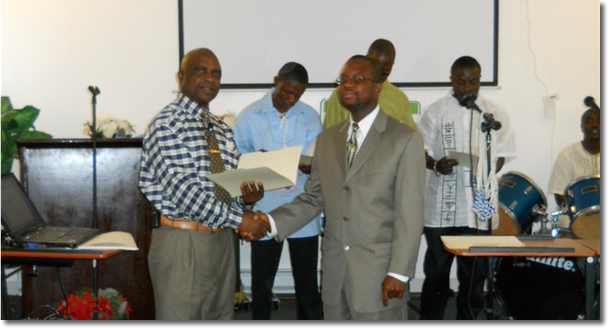
Word of Life Int'l visioned to empower the preaching of the Gospel of Jesus Christ and to feed the flock. To lovingly shepherd the congregation by means of spiritual guidance, administration, supervision and mentoring for the purpose of making disciples who will become disciple-makers. To edify the body of Jesus Christ for the work of the Holy Spirit as instructed and mandated in the written Word of God.
The Pastoral Board is supervised by the Founder/Overseer with the help of the Advisory Board, our Leadership Board and all ordained staffs. The Pastors and Ministers are responsible for proclaiming the gospel of Jesus Christ, teaching biblical revelation, serving in pastoral care functions and acting as chief administrator of the Church. The pastoral ministry accomplishes its mandate (to inspire and motivate the congregation to live and proclaim the gospel message of Jesus Christ) by fulfilling six basic functions outlined below. The main objective of this ministry is to equip the body of Christ to become disciple-makers for Jesus Christ.
The spiritual development of the membership is promoted by preaching Christ-centered and biblically sound sermons, leading Bible studies and providing other spiritual and Christian leadership instruction for the congregants. In addition, the pastor trains and supervises local small groups facilitators, provides discipleship classes, coordinates local evangelism, and ordains deacons, deaconesses and local church elders according to the needs and the circumstances of the congregation.
Training and Supervision of Local Leaders The pastor is responsible to supervise the training of the local leaders, and to ordain elders, deacons and deaconesses as needed for the congregation. He also supervises all church leaders in the administration of the local church, and completes annual evaluations of associate and assistant pastors and any ministerial trainees.
An important aspect of the pastoral ministry is to officiate and administer the various ceremonies needed for the spiritual care and development of the congregation, including (but not limited to) the Lord's Supper, baptism, wedding, funeral and blessing of children ceremonies. Also included is the prayer for and anointing of the sick, as well as a variety of celebrations connected to main events in the lives of the members.
The pastoral ministry is also responsible to promote and facilitate the involvement of the congregation in the local community. The pastor himself is actively involved in promoting interdenominational cooperation, attending community functions as a representative of the church and conducting more specialized outreach services.
The pastor supervises the maintenance of an accurate and standardized membership file of all church members, and administers church assistance to needy members according to denominational and local guidelines. He selects and coordinates an Advisory Council to help with church planning and administration, including ministerial and church expenses, hall rentals and local bank accounts. He also administers and coordinates the employment and use of local human and physical resources.
An important aspect of pastoral ministry is that of building lasting relationships with all members and prospective members of the congregation while offering spiritual guidance and comfort as needed. This is accomplished by visiting with the membership and by providing spiritual comfort and biblically sound counsel to congregants on spiritual matters. The pastoral ministry is a vital part of our congregation. It is our prayer and sincere hope that God may use this ministry not only to spiritually enrich and bless the congregation, but to equip and motivate the disciples of Jesus Christ to become mature disciple-makers who will glorify our loving Father in heaven.




